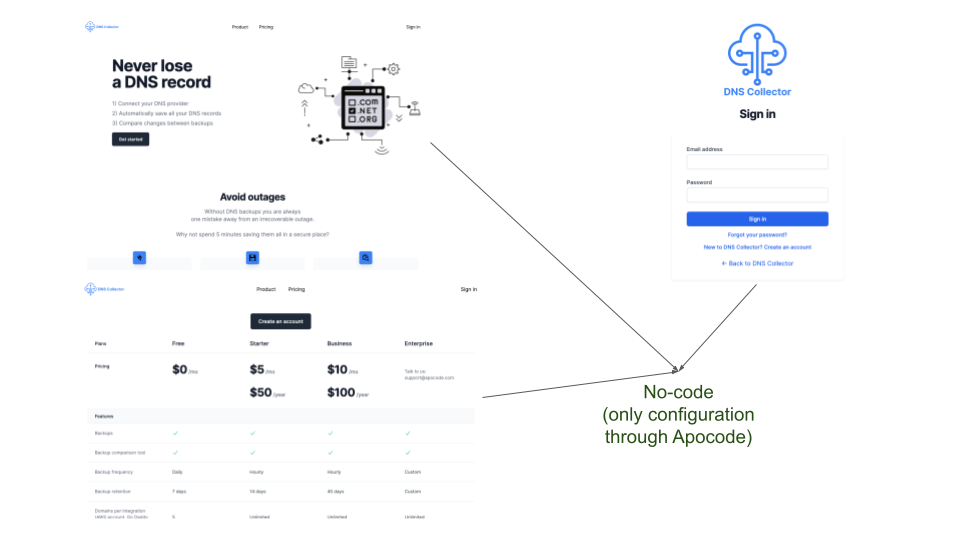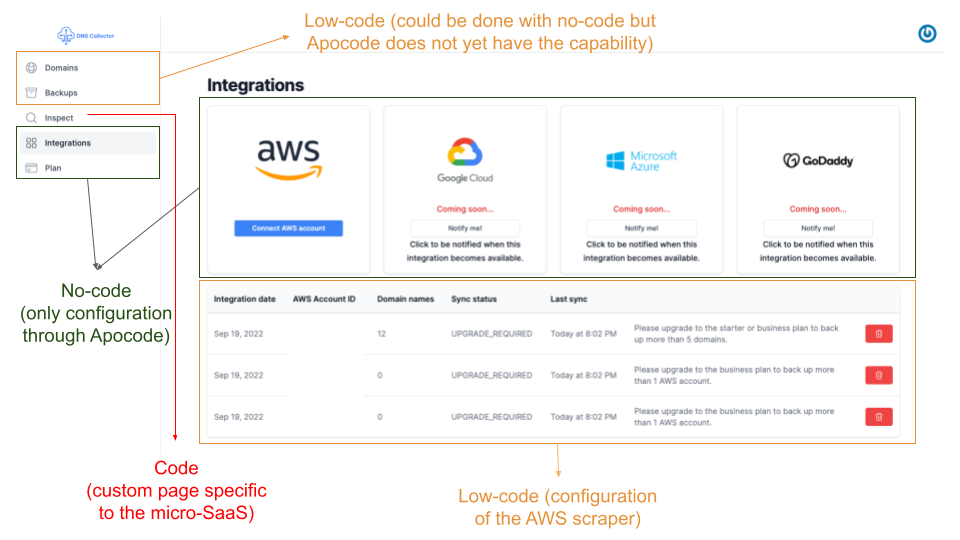The micro-SaaS challenge: Day 10 (Building Apocode #3)

Ten days ago I started the micro-SaaS challenge, aiming to launch 10 micro-SaaS products in 100 days, while building Apocode (a new UK based startup helping entrepreneurs create SaaS products without writing code).
The main objective is to ensure Apocode will offer the right features for customers, but this will also allow me to experiment with product ideas I have thought of over the years.
So, what do I have to show after 10 days?
The first micro-SaaS
When accessing a website, one of the first tasks your computer performs is translating the domain of the website to an IP address using the Domain Name System (DNS). You can think of it as "the phonebook of the Internet".
Each domain owner has to create and maintain DNS records (phonebook entries) with their DNS provider (local yellow pages office) to ensure their website can be reached. This can be painful for 2 reasons:
- DNS providers don't offer an undo button, so making a bad change can lead to outages. In previous jobs, I mitigated the issue by copying DNS entries manually in a safe place before modifying them.
- It's hard to know what other people may have changed. In most businesses, it is convenient to allow several people to edit DNS records. But what if they make bad changes, even for good reasons, like setting up a new marketing tool? Or what if an automated process wrongly updates the DNS records?
Being the person in charge of DNS can be stressful. Issues are infrequent, but can be quite disruptive. Having faced a few of these myself, I decided to dedicate the first micro-SaaS to solving this problem.
DNS Collector, launching today, will help enterprises take regular backups of their DNS records and visualise any changes between backups.
As it is the first product ever created and launched through Apocode (apart from Apocode itself, but more on that another time), it is still a bit rough around the edges: some pages are flickering, some API calls are slow, and the styling might feel a bit odd at times. However, this will be fixed automatically as Apocode improves.
Also, it currently only integrates with one DNS provider (AWS). Again, this inconvenience will be rectified later, as Apocode starts to offer a larger library of integrations.
A mix of low-code and no-code
DNS Collector is a good first step towards the creation of a no-code SaaS builder, but it is (not yet) entirely built using no-code. Its pages fall into one of three categories:
- No-code: The majority of the pages were created without writing any code outside of Apocode. Instead, the DNS Collector branding was applied through configuration. Here are a few examples of no-code pages: landing page, pricing page, sign-in page, sign-out page, password reset pages, plan selection page, and half of the integrations page.

- Low-code: Other pages required some extra code, but only because the range of configuration options offered by Apocode is not yet very wide. In future micro-Saas products, these will move from the low-code to the no-code category.

- Code: One of the pages, the backup comparison tool, is highly specific to DNS Collector, so it had to be written manually. I mentioned in a previous article that Apocode will help entrepreneurs automate 90-95% of the creation of SaaS tools. This page is an example of what would be in the remaining 5-10%. I have a few ideas on how to make it easy for users to create such pages, whilst still building the rest of their products through no-code.
What's next?
I am already working on the remaining 9 micro-SaaS products. Like the first one, they will solve very specific problems I have experienced myself. Some will be technical, but others will appeal to a wider audience.
If you want to provide feedback or follow the journey, you can join Apocode's product waitlist, subscribe to my blog, or email me at nicolas@apocode.com